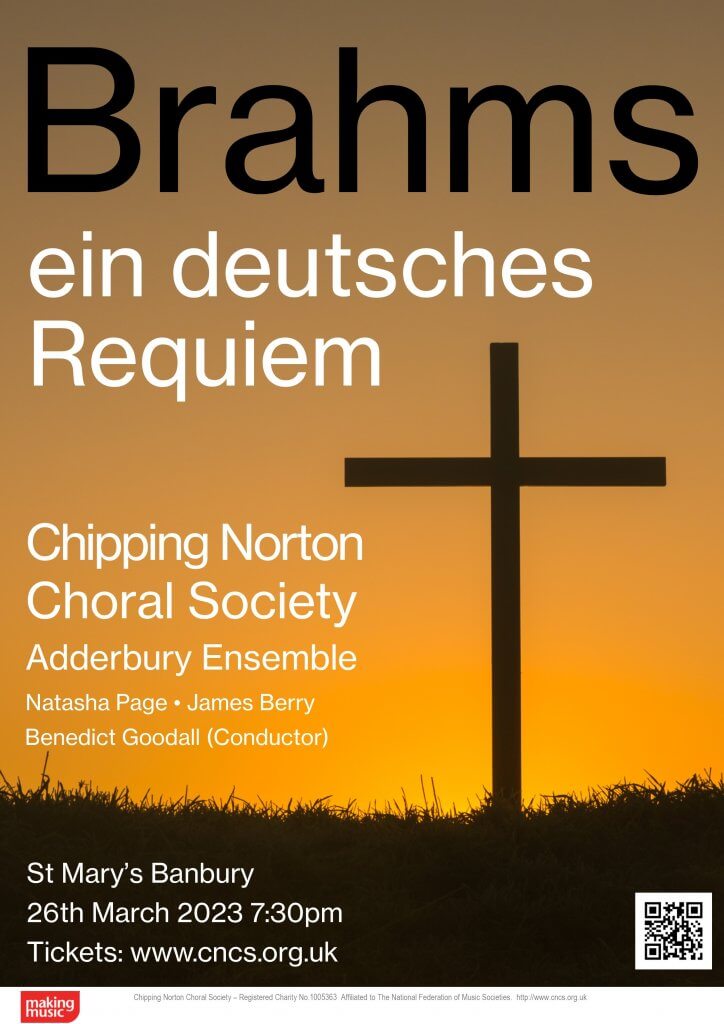Hello everyone, thanks for another great rehearsal on Wednesday, we’re making fantastic progress. I also want to thank you for all of the hard work you’re putting in at home; but this is one of those occasions where I’m going to keep asking that of all of you, as we begin to focus on the hardest parts of the piece, and start to refine everything we’ve done. I know you’ll keep learning the notes at home, and making sure your copies are marked, and will listen to the pronunciation guides below, because that’s what makes CNCS such a good team!
What we did on Wednesday 8th February
We started by working on the opening of Movement VI Denn wir haben, putting text to the notes we learnt last week. Lots of good things here, ensuring the blend was good, and the notes were clear – we even managed to do some work on the expression of the music, such as the short notes at the start followed by the more lyrical sections. Keep the energy going at bar 69 “zu der Zeit” so it’s maintains the excitement in the build up to the Vivace.
After this we sang through much of Movement VII Selig sind die Toten only stopping to rehearse after the first full section on page 86. In the rehearsing of this, we clarified notes, but also made sure the suspensions were fully embraced and given direction, such as in bar 33 in the Altos. We rehearsed the entries in bar 48, ensuring they were confident and bang in time. We also sang sections like bars 60 and 111 to keep them metronomically in time. Then we moved on to bar 130, looking at the flow of the triplets and the rhythmic push of the triplets against duplets. This section is very similar to the opening, but not identical – don’t become complacent, but apply the beautiful lines and rich sounds to this section.
We ended by singing through Movement II Denn alles Fleisch which sounded great, for the most part! I’m very happy with the opening, but we’ll still need to just tighten up Letters C to E, so please look at those notes. We’ll need to practice the join between Letter H and bar 206, getting into the “Die Erloeseten” section more succinctly, Basses. We worked on the “und Schmerz” and “wird weg“s to get the quality of the chords perfectly together, but then shortened them and put them in the situation of the piece. We then looked at bar 269, making the entries very accurate and exciting, and finished at Letter M.
What we will do on Wednesday 15th February
We’ll start with a tutti rehearsal on Movement III Herr, lehre doch mich from Letter E “Ach, wie gar nichts” to bar 172 (the only section we haven’t covered), and then we’ll be split off into sectionals for the Fugue in Movement VI Denn wir haben, bar 208. Finally, we’ll come back together and see how much of the Fugue we can put together.
Marked Scores
The complete Marked Score is now below so do go through and put the new markings in. I’d expect these to be in by now, but they need to be in by half term.
Recommended Recordings
There are many fabulous recordings of this piece, including this one by the late great Bernard Haitink.
However, we’re doing an incredible version for chamber orchestra, with our friends from the Adderbury Ensemble. In this chamber arrangement, the arranger (Joachim Linckelmann) keeps all of the wonderful colours and atmospheres of the original orchestration, but reduces the orchestra to a manageable size. This is my recommended recording, and you can listen HERE.
Learning Resources
Fortunately, there are plenty of resources out there to assist you in your learning – please take the time to listen to the learning tracks, and to digest this piece properly; it’s tricky, and you’ll need to be on it.
Pronunciation Guide
We’ll be doing lots of work on the German pronunciation, and will be getting some coaching through the rehearsals too. However, you can make a good head-start on it by listening to this Pronunciation Guide.
Chord Perfect
These learning tracks are great as they are real singers amplified for the respective voice parts! It may help you to have real singers leading your learning, and it’s free! Just be aware that the ‘wobble’ on each voice can be quite pronounced (great for Brahms, but can lead to slightly flat singing if you slow it down).
Soprano
Alto
Tenor
Bass 1
Bass 2
John Fletcher Music
Another great aid in learning, particularly as you can isolate your part or have all parts together. The sound is clear and easy to pick up, but it doesn’t do text. Check it out here.
Choralia
The most flexible option here as you can speed it up/slow it down, get certain voices to become more prominent, and it has a click track to help you keep in time. However, it’s the most rudimentary sound of the lot, so try not to sound too ‘computer-like’. Have a look.
This is by no means an exhaustive list, so if you find these don’t help then feel free to do your own digging. The most important thing is that you engage with this, and put the time in at home to learn it. We all saw the difference it made over 3 days for the Christmas concert... imagine how incredible you’ll sound if you start now!
Half Term
A reminder that there’s still a rehearsal on the 15th February, but NOT one on the 22nd February. I know this is different to the Chipping Norton half term dates, so I can only apologise for any confusion or faff with this.
Poster and Tickets
Below is the wonderful poster Brian has produced, so start sharing it far and wide. You can also get your tickets HERE.

This Week’s listening
Some more Brahms this week, given we’ve delved so deeply into his Requiem. I highly recommend listening to the whole of this piece, but I thought I’d share with you the final movement of his Symphony no. 1. Brahms started working on the symphony in 1855 and after 21 years of working on it it was premiered in Karlsruhe. Despite his own critical expectation that the piece would never live up to, yet was considered the spiritual successor to, Beethoven’s Ninth Symphony (and in this final movement even the main theme sounds like it draws inspiration from Beethoven’s ‘Ode to Joy‘), it remains a firm favourite in the repertoire of orchestras and audiences, and I hope you can see why. Listen HERE.
See you on Wednesday 15th.
– Ben
